Each winter at the Kevin Workman Foundation brings a new season of artist nominations for our Sponsored Artist program, and an ever-higher bar of talent in the application pool. Reviewing portfolios, receiving advice and mentorship from the professional artists on our review board, and chatting with nominees during interviews is a high point of my year. And as I wrapped up the selection process with KWF's board, 2018 began with a feeling of inspiration and certainty that the Foundation's decision to sponsor Micaela Dawn for 2018's San Diego Comic-Con was the right one.
Micaela is a freelance illustrator with several awards under her belt, and an impressive CV. Her work has been featured in Spectrum 23, on covers of Victor Lavalle's Destroyer series and Saladin Ahmed's Abbott, and several international galleries.
But Miceala didn't arrive at her bold, colorful, confident style by traveling along a clear path through placid meadows of creative inspiration. There were reversals and switchbacks as she scouted a trail through forests of uncertainty that were at times confusing and dark.
Talking with Micaela, and learning about her through the story of her artistic works, I'm reminded that courage is not about how you feel, but about what you do.
Let's take a look.
Micaela is a freelance illustrator with several awards under her belt, and an impressive CV. Her work has been featured in Spectrum 23, on covers of Victor Lavalle's Destroyer series and Saladin Ahmed's Abbott, and several international galleries.
But Miceala didn't arrive at her bold, colorful, confident style by traveling along a clear path through placid meadows of creative inspiration. There were reversals and switchbacks as she scouted a trail through forests of uncertainty that were at times confusing and dark.
Talking with Micaela, and learning about her through the story of her artistic works, I'm reminded that courage is not about how you feel, but about what you do.
Let's take a look.
Origins:
Those of you who have even a passing familiarity with KWF know that we're fascinated with the origin stories of our sponsored artists. Micaela's is clear, succinct, and vivid:
"When I was a young girl, I absolutely loved to create with anything around me. I grew up near the mountains so I had a very wild childhood where I could use nature to create with whatever I found in the forest."
In Micaela's case, the trackless, thorny wilderness wasn't just natural in origin. It had a complex, sometimes unforgiving emotional and social context. It was in this wilderness, literal and figurative, that she found a proving ground for self-confidence.
Even just a few pixellated video frames into the Foundation's Google Hangout interview with Micaela, we could see the quiet confidence in the way she carried herself. And since courage and grit don't come from a life of ease, the emotional turbulence that Micaela recounts must have been a crucible for the formation of something important in her childhood, something no less significant than her creative identity.
"I think courage itself is one of the themes that I find really inspires me. The courage to exist and continue through difficulties. Sweeping, epic stories would be boring without the mountains the characters need to climb. They wouldn’t inspire us otherwise. So I’ve always wanted to create art that tells stories. Growing up, many of the things I did, I did because of fear. I went into psychology because I was afraid I wouldn’t find success in art. I dated men as a teenager because I was afraid of being attacked for being a lesbian. I never told anyone about my depression and anxiety as a teenager because I was afraid of being looked down upon."
Those of you who have even a passing familiarity with KWF know that we're fascinated with the origin stories of our sponsored artists. Micaela's is clear, succinct, and vivid:
"When I was a young girl, I absolutely loved to create with anything around me. I grew up near the mountains so I had a very wild childhood where I could use nature to create with whatever I found in the forest."
In Micaela's case, the trackless, thorny wilderness wasn't just natural in origin. It had a complex, sometimes unforgiving emotional and social context. It was in this wilderness, literal and figurative, that she found a proving ground for self-confidence.
Even just a few pixellated video frames into the Foundation's Google Hangout interview with Micaela, we could see the quiet confidence in the way she carried herself. And since courage and grit don't come from a life of ease, the emotional turbulence that Micaela recounts must have been a crucible for the formation of something important in her childhood, something no less significant than her creative identity.
"I think courage itself is one of the themes that I find really inspires me. The courage to exist and continue through difficulties. Sweeping, epic stories would be boring without the mountains the characters need to climb. They wouldn’t inspire us otherwise. So I’ve always wanted to create art that tells stories. Growing up, many of the things I did, I did because of fear. I went into psychology because I was afraid I wouldn’t find success in art. I dated men as a teenager because I was afraid of being attacked for being a lesbian. I never told anyone about my depression and anxiety as a teenager because I was afraid of being looked down upon."
"Your pain is the breaking of the shell that encloses your understanding. | Winding Paths: Winding, fraught paths start in adolescence for many of us, and we take our entire lives striving to navigate them. But along the way, we discover ourselves. In Micaela's case, the treasures she discovered seem to have been authentic statements of style and technique: "As I grew up, I took art classes throughout school; but always stuck to traditional media. Even when many of my friends were using digital tech for their work, I was worried about being considered a ‘real’ artist if I used something that was non-traditional. When I was younger it felt exceptionally difficult to get through the stigma of digital art as ‘cheating’. I had members of my family who were traditional artists, and when I finally began to create work with a tablet, they would ask me when I was going to start making ‘real art’ again. Even then, I absolutely fell in love with digital media. That’s not to say that I only found inspiration in artists whose practice was mainly digital. After I graduated high school, I worked at a sculpture studio for several years to save up the money to travel to Europe to see the absolutely jaw-dropping work in the galleries there." |
Here Micaela's creative journey reminds us not to listen to voices of judgement, especially if they're our own. In Micaela's realization of this, the fuel that powers her art transitions from the mind-focused, technical fixation of a journeywoman to the heart-focused emotiveness of a master. And this is what took our breath away at the portfolio reviews: A razor-sharp, almost ascetic approach to thematic content, with raw emotion and drama.
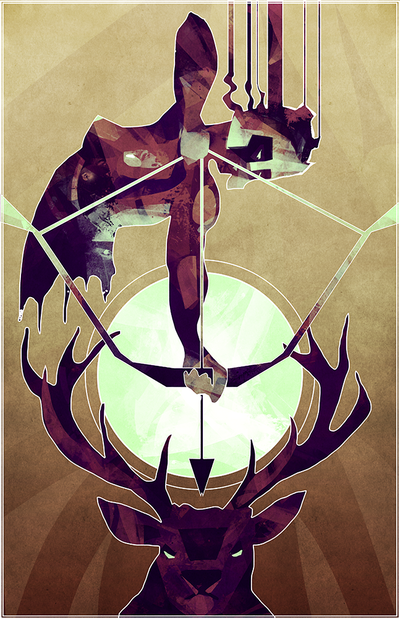 The Huntress - www.micaeladawn.com
The Huntress - www.micaeladawn.com "Now, this is around the time that I really started to pay attention to not just the craft but who was creating the work and the subject matter. Before then, I just liked art because of any number of random reasons. Colour, shape, or lighting. But after visiting Europe I really started to recognize how few female artists were represented in the galleries and I started doing more research into artists like Artemisia Gentileschi who had such emotion in her works and had the courage to create these beautiful and violent works of art despite the obstacles she had to overcome."
Strength in Authenticity and Artemisia:
Micaela sought the courage to be an authentic version of herself, and describes it as the hardest-won battle of all. Micaela's recounting of this period, and how it's exemplified the life and work of Artemisia, seems to be a struggle made of equal parts suffering, transformation, and redemption:
"All of these influences began to help shape the direction that I wanted to explore with my art. When I returned from my travels, I actually went to school to study psychology and English. ...I felt that I needed to go into a mainstream career in order to succeed in life. But I was absolutely miserable when I wasn’t creating something. Eventually, I realized that having a successful life and having a fulfilling life did not necessarily bring me down the same path."
Micaela spent most of her spare time writing and reading and creating art. And finally, in the first step that led to a thousand more, she quit her degree in psychology to take up studies in character design and illustration instead. All creation stems from raw materials liberated in the destruction of something else, and here Micaela's courage to take the first step took inspiration from Artemisia's life:
"It was when I started embracing the strength I found in art and in stories that things became interesting. So when I start an illustration or a series of pieces, I like to think about what story I want to tell and what I want others to take away from my art. If I can have the same positive impact on others that my creative heroes had on me, then I think that is true success and fulfillment. We’re not alone in the big world of art and creating, and too often it feels that way."
In this, we begin to hear Micaela's voice for projects that speak to her desire for equality and the promotion of women’s rights. Stirred by this unapologetic authenticity, the deep, powerful currents of Micaela's work begin to sweep us along:
"Once I have an idea of what I want to say in a work, I start to think of the stories, colors, and shapes that might help tell that story. I often find inspiration in myths and legends; some of humanities’ oldest forms of creativity. When the idea starts to take shape, I begin sketching..."
Micaela chooses compositions and subjects using herself in reference photos. And here she describes raw, unflinching creative process: Self-taken photos in awkward positions and angles, lighting, and pose reference. Hundreds of file folders, images of Micaela dressed up in random pieces of fabric, holding swords, or awkwardly staring into the camera with weird, exploratory lighting.
"...I choose something that scares me (a color I hate using, a difficult composition, a difficult subject matter) and I try to tackle that in my art. By putting myself in a situation where I feel raw and vulnerable in my art I find I often create more powerful images."
The hunters, huntresses, daemons, saints, predators, and prey in Micaela's work: They are all unflinching self-portraits.
Micaela sought the courage to be an authentic version of herself, and describes it as the hardest-won battle of all. Micaela's recounting of this period, and how it's exemplified the life and work of Artemisia, seems to be a struggle made of equal parts suffering, transformation, and redemption:
"All of these influences began to help shape the direction that I wanted to explore with my art. When I returned from my travels, I actually went to school to study psychology and English. ...I felt that I needed to go into a mainstream career in order to succeed in life. But I was absolutely miserable when I wasn’t creating something. Eventually, I realized that having a successful life and having a fulfilling life did not necessarily bring me down the same path."
Micaela spent most of her spare time writing and reading and creating art. And finally, in the first step that led to a thousand more, she quit her degree in psychology to take up studies in character design and illustration instead. All creation stems from raw materials liberated in the destruction of something else, and here Micaela's courage to take the first step took inspiration from Artemisia's life:
"It was when I started embracing the strength I found in art and in stories that things became interesting. So when I start an illustration or a series of pieces, I like to think about what story I want to tell and what I want others to take away from my art. If I can have the same positive impact on others that my creative heroes had on me, then I think that is true success and fulfillment. We’re not alone in the big world of art and creating, and too often it feels that way."
In this, we begin to hear Micaela's voice for projects that speak to her desire for equality and the promotion of women’s rights. Stirred by this unapologetic authenticity, the deep, powerful currents of Micaela's work begin to sweep us along:
"Once I have an idea of what I want to say in a work, I start to think of the stories, colors, and shapes that might help tell that story. I often find inspiration in myths and legends; some of humanities’ oldest forms of creativity. When the idea starts to take shape, I begin sketching..."
Micaela chooses compositions and subjects using herself in reference photos. And here she describes raw, unflinching creative process: Self-taken photos in awkward positions and angles, lighting, and pose reference. Hundreds of file folders, images of Micaela dressed up in random pieces of fabric, holding swords, or awkwardly staring into the camera with weird, exploratory lighting.
"...I choose something that scares me (a color I hate using, a difficult composition, a difficult subject matter) and I try to tackle that in my art. By putting myself in a situation where I feel raw and vulnerable in my art I find I often create more powerful images."
The hunters, huntresses, daemons, saints, predators, and prey in Micaela's work: They are all unflinching self-portraits.
Hidden Catalysts:
Micaela finds inspirations in the hidden stories of women and minorities ignored by the arcs of traditional history and literature:
"Especially in stories where women played an integral role in the story, but have little in the way of a voice. They are often a catalyst for events, such as the death of Lenore in Edgar Allen Poe’s The Raven."
Micaela finds inspirations in the hidden stories of women and minorities ignored by the arcs of traditional history and literature:
"Especially in stories where women played an integral role in the story, but have little in the way of a voice. They are often a catalyst for events, such as the death of Lenore in Edgar Allen Poe’s The Raven."
Micaela tells us how the classics give us women as characters with no purpose other than to move the male protagonist’s story forward, such as Shamhat in the Epic of Gilgamesh:
"These women have a voice and deserve to share it in the same way women and minorities today deserve to share their stories. I am currently in the middle of creating another illustration in the series that focuses on Nimue; the enchantress that is so often only know by her relation to King Arthur as the Lady in the Lake who gives him the sword Excalibur. Without Nimue, the tales we know about King Arthur would be drastically different, and yet very few people know her by any of her names aside from The Lady of the Lake... Stories (whether told through writing, art, performance, or other creative ways) belong to everyone; they are something that links us all."
Micaela clearly believes that our most important stories include the voices of all.
"These women have a voice and deserve to share it in the same way women and minorities today deserve to share their stories. I am currently in the middle of creating another illustration in the series that focuses on Nimue; the enchantress that is so often only know by her relation to King Arthur as the Lady in the Lake who gives him the sword Excalibur. Without Nimue, the tales we know about King Arthur would be drastically different, and yet very few people know her by any of her names aside from The Lady of the Lake... Stories (whether told through writing, art, performance, or other creative ways) belong to everyone; they are something that links us all."
Micaela clearly believes that our most important stories include the voices of all.
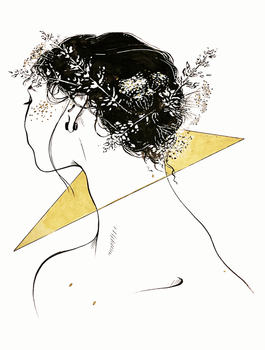 Inktober 2016 - www.behance.net/DawnDesign
Inktober 2016 - www.behance.net/DawnDesign Finding Community:
Micaela uses a combination of passion, courage, and well-chosen technological tools to find and build community. For artists who live in small communities across the world, she recommends any number of online resources:
"I’ve had the tremendous fortune of joining several online groups through Facebook, Discord, Slack, and other tools that help connect everyone over great distances. These groups; often ones with numerous other women artists, have helped me gain a perspective on the world and on storytelling that I would never have been exposed to if I had remained closeted in a small-town. I recommend reaching out to those who inspire you and join online communities. On top of that, sharing your experiences and helping teach others can have a tremendous impact on your creative career. By sharing what you learn with others, the world suddenly doesn’t seem to big and scary. Tools, tips, and tricks of the trade do not create art on their own. They simply help us engage with others and enhance the stories we want to tell. So there is no reason to be afraid of sharing a wealth of knowledge with others."
Micaela uses a combination of passion, courage, and well-chosen technological tools to find and build community. For artists who live in small communities across the world, she recommends any number of online resources:
"I’ve had the tremendous fortune of joining several online groups through Facebook, Discord, Slack, and other tools that help connect everyone over great distances. These groups; often ones with numerous other women artists, have helped me gain a perspective on the world and on storytelling that I would never have been exposed to if I had remained closeted in a small-town. I recommend reaching out to those who inspire you and join online communities. On top of that, sharing your experiences and helping teach others can have a tremendous impact on your creative career. By sharing what you learn with others, the world suddenly doesn’t seem to big and scary. Tools, tips, and tricks of the trade do not create art on their own. They simply help us engage with others and enhance the stories we want to tell. So there is no reason to be afraid of sharing a wealth of knowledge with others."
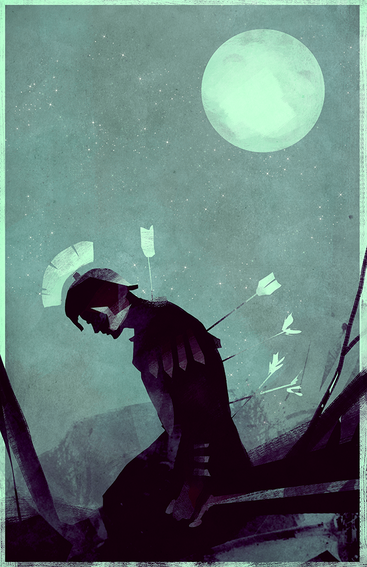 Nameless Night - www.micaeladawn.com
Nameless Night - www.micaeladawn.com Feeling Fear is the Essence of Courage:
Micaela closes by reminding us that courage is not about cultivating fearlessness, but facing fear:
"I also want to take a moment to recommend that artists try things that scare them. Submit your art to collections that intimidate you. Reach out to artists that inspire you. Apply to events and opportunities that you never expect to receive or be included in. Finding that place of vulnerability with the artistic community can be life-changing. The first time I submitted my artwork to Spectrum, I was terrified of being rejected, and in spending money on something that wasn’t a ‘slam dunk’. And you will fail. You will fail again and again and find rejection around every corner. But unless you try, you’ll never reach that ‘yes’, or that moment when something clicks. You’ll never find strength in your voice. I spent two years on a kick-starter aimed at creating a deck of cards featuring women from history illustrated by 54 women from across the world. I waltzed into the unknown and nearly brought the project to life (we raised just over 80% of our funding goal. In the end, the project was unsuccessful. It failed. But in that failure I learned so many things that I can now apply to future projects. Failure is not a negative outcome. Just a difficult one."
Micaela closes by reminding us that courage is not about cultivating fearlessness, but facing fear:
"I also want to take a moment to recommend that artists try things that scare them. Submit your art to collections that intimidate you. Reach out to artists that inspire you. Apply to events and opportunities that you never expect to receive or be included in. Finding that place of vulnerability with the artistic community can be life-changing. The first time I submitted my artwork to Spectrum, I was terrified of being rejected, and in spending money on something that wasn’t a ‘slam dunk’. And you will fail. You will fail again and again and find rejection around every corner. But unless you try, you’ll never reach that ‘yes’, or that moment when something clicks. You’ll never find strength in your voice. I spent two years on a kick-starter aimed at creating a deck of cards featuring women from history illustrated by 54 women from across the world. I waltzed into the unknown and nearly brought the project to life (we raised just over 80% of our funding goal. In the end, the project was unsuccessful. It failed. But in that failure I learned so many things that I can now apply to future projects. Failure is not a negative outcome. Just a difficult one."
Onward:
Micaela's journey shows us that these trials and tribulations can lead us to places of great joy. But we're also best served by packing a sense of humor before we depart on any grand creative adventures. Artists are more than just the sum of their most serious work. Sometimes we need a little yin to balance our yang. And here's where Micaela adores improv comedy, performing in a group called The 404s. She's also an accomplished fire performer, with not-so-secret fire-eating talents. (Despite her attempt to bury the lede in her email! We noticed!)
And in general:
"I am also so, SO good at eating. I try to enjoy adventurous foods wherever I travel and love to form new connections over a delicious meal."
Us too!
People like Micaela remind the friends, family, and community in the Kevin Workman Foundation of why we commit ourselves to finding and giving inspiration. Today, our Sponsored Artist is Micaela. And tomorrow? Micaela thinks it could be you.
"When I applied for the Kevin Workman Foundation I had no expectations of being chosen. I thought it would be an amazing opportunity, but the thought of sharing my work and journey with strangers and then potentially attending the largest comic convention in the world, frankly, terrified me. And that is exactly why I submitted anyway. If I want to have a voice in the same way the characters in my art do, I need to take that leap into the unknown. And you should too."
Micaela's journey shows us that these trials and tribulations can lead us to places of great joy. But we're also best served by packing a sense of humor before we depart on any grand creative adventures. Artists are more than just the sum of their most serious work. Sometimes we need a little yin to balance our yang. And here's where Micaela adores improv comedy, performing in a group called The 404s. She's also an accomplished fire performer, with not-so-secret fire-eating talents. (Despite her attempt to bury the lede in her email! We noticed!)
And in general:
"I am also so, SO good at eating. I try to enjoy adventurous foods wherever I travel and love to form new connections over a delicious meal."
Us too!
People like Micaela remind the friends, family, and community in the Kevin Workman Foundation of why we commit ourselves to finding and giving inspiration. Today, our Sponsored Artist is Micaela. And tomorrow? Micaela thinks it could be you.
"When I applied for the Kevin Workman Foundation I had no expectations of being chosen. I thought it would be an amazing opportunity, but the thought of sharing my work and journey with strangers and then potentially attending the largest comic convention in the world, frankly, terrified me. And that is exactly why I submitted anyway. If I want to have a voice in the same way the characters in my art do, I need to take that leap into the unknown. And you should too."

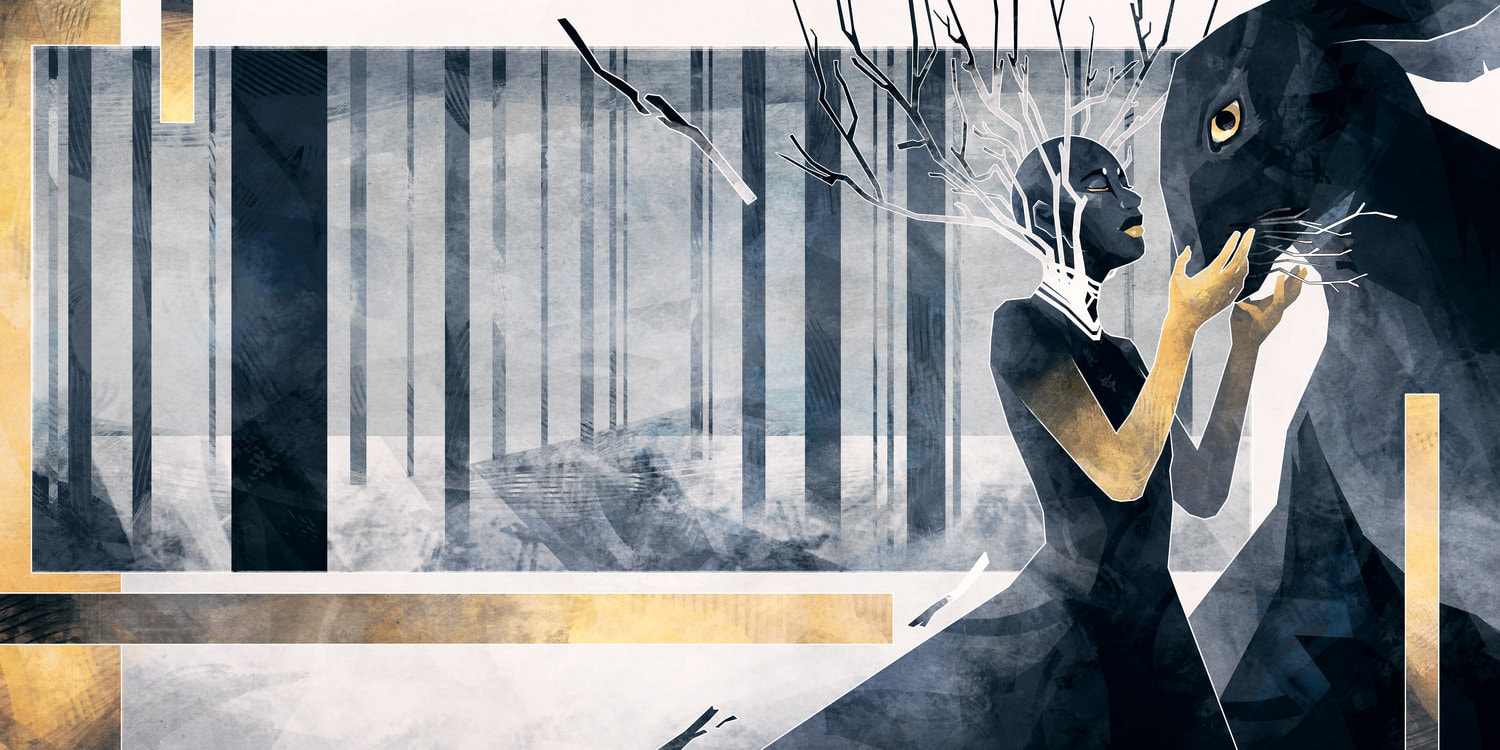
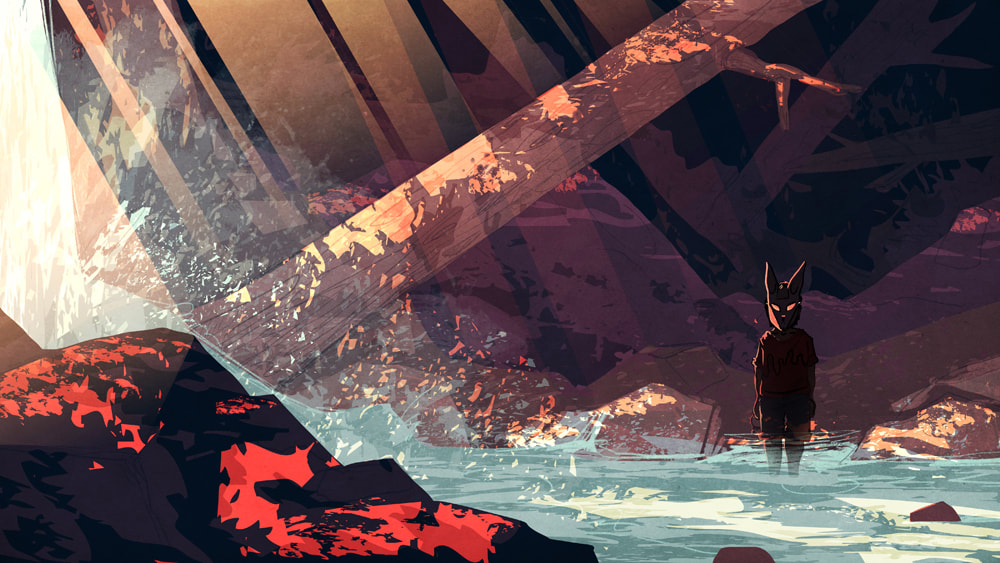
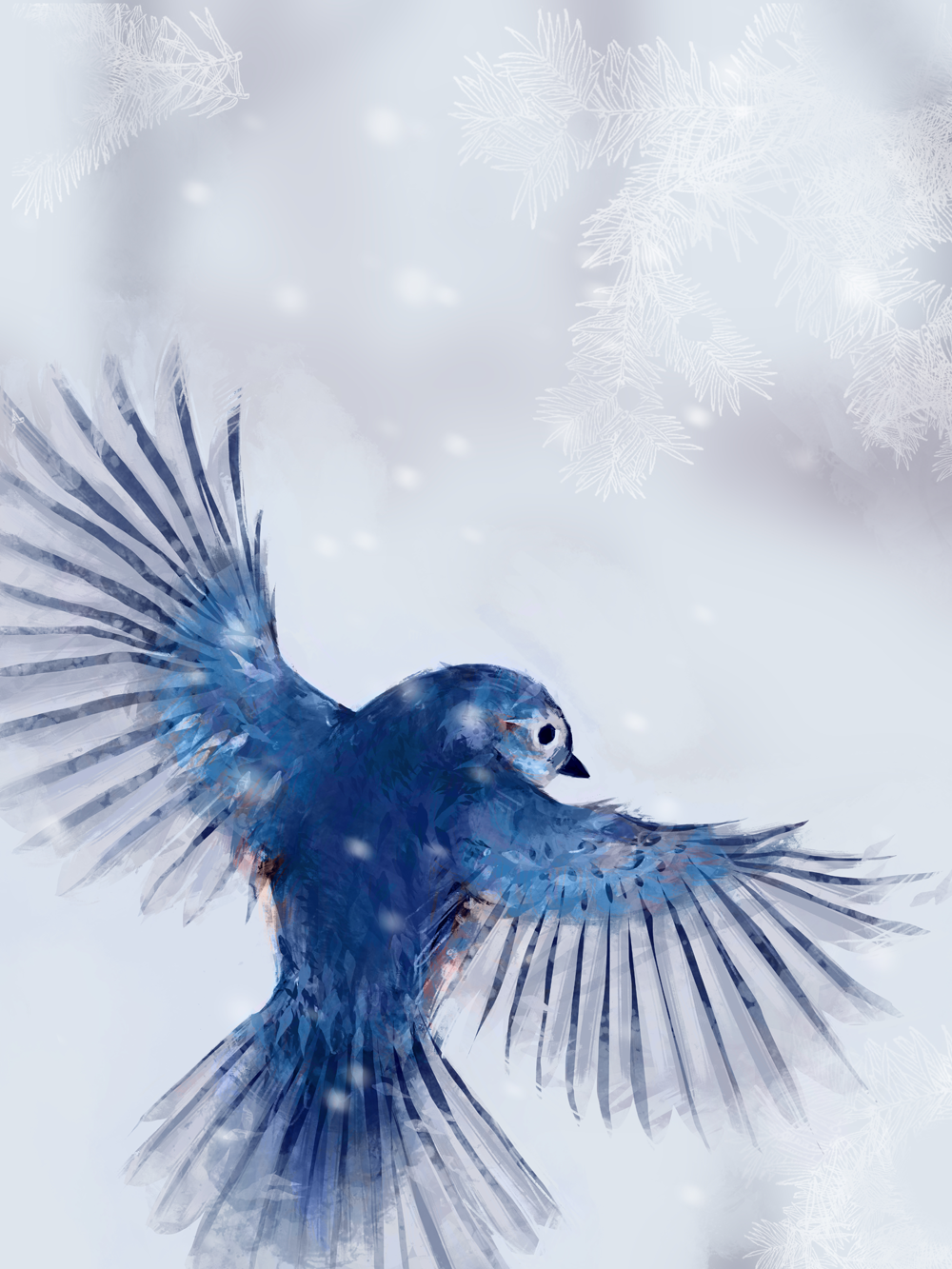
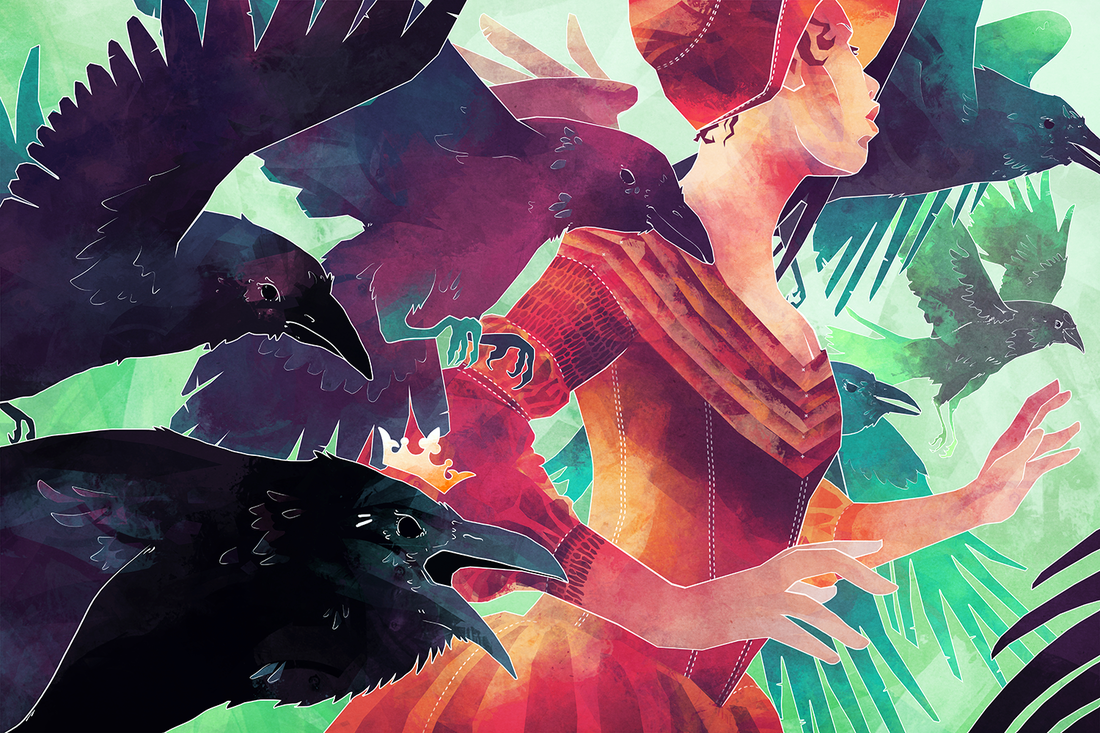
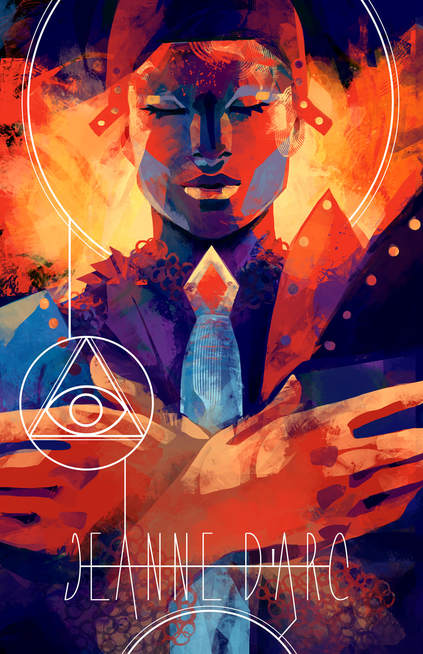
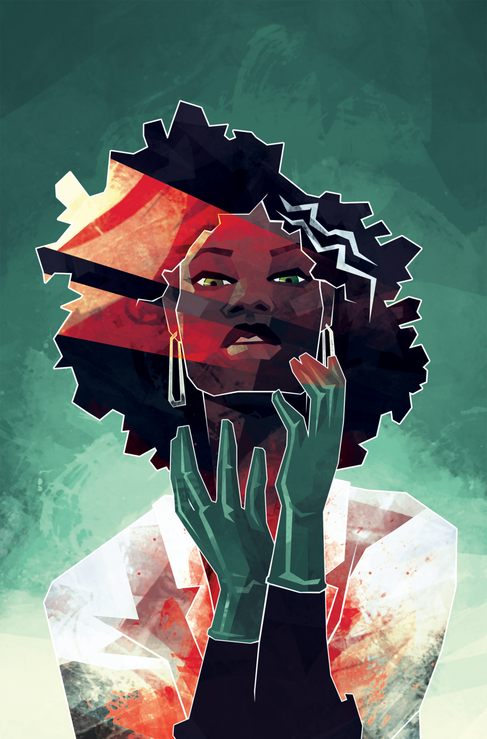
 RSS Feed
RSS Feed